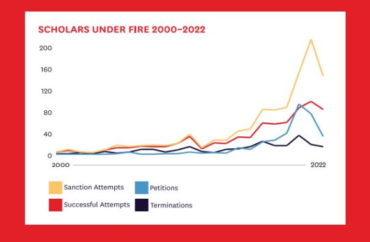
Most targeted for ‘expressing a personal view or opinion on a controversial social issue’
The number of attempts to sanction scholars for Constitutionally protected speech shot up over the past several years, according to a report recently released by the Foundation for Individual Rights and Expression.
FIRE analyzed more than two decades’ worth of data regarding successful and attempted “targeting incidents” on American professors and researchers for controversial speech protected under the First Amendment.
“Over these years, a total of 1,080 sanction attempts have been documented, and nearly two-thirds of them have resulted in some form of sanction (698 of 1080, or 65%),” according to the report, released April 20. “This includes 225 terminations, with 60 involving tenured professors.”
“Scholars Under Fire: Attempts to Sanction Scholars from 2000 to 2022” includes a database detailing the incidents.
FIRE found the annual number of attempted punishments for scholars’ speech has grown significantly over time, from four cases in 2000 to 145 in 2022.
Additionally, “the number of scholars punished in the past three years (509) nearly matches the number of scholars sanctioned in the 20 years prior to 2020 (571),” according to the study.
The report points out that those from political left of the scholar have initiated more sanction attempts than those from the political right.
FIRE Director of Faculty Outreach Komi Frey, lead author of the report, told The College Fix via email the spike in the past few years is due to a combination of factors, including the COVID lockdowns and Black Lives Matter protests.
“During the pandemic, there was tremendous uncertainty, stress, and anxiety, especially among students, who were also isolated from one another and spent more time online,” she said via email. “Then, the death of George Floyd sparked national outrage about racial injustice not only in the realm of policing, but in all American institutions, including higher ed.”
“Progressives, especially students, effectively mobilized online and spread petitions [and] letters demanding change, often in response to isolated comments they believed were evidence of systemic racism. And tensions were already high because of the 2020 presidential election,” Frey said.
Prior to that, Donald Trump’s 2016 election and the growth of social media drove the initial spike in sanction attempts, she said.
In the report, Frey wrote that the issue is a real and pressing problem facing academia: “Cancel culture is particularly pernicious when it targets people charged with discovering and disseminating knowledge.”
“Vocal, dogmatic minorities on the left and the right are trying to restrict the range of acceptable ideas in institutions of higher education, and this should alarm us all,” Frey stated in the report. “You do not need to agree with a scholar’s teaching, research, or extramural speech to recognize that censorship is not the answer.”
Among some of the examples cited in the report, Concordia College in Wisconsin suspended a professor in March of last year after he criticized “woke dysphoria” at the school, The College Fix reported in a story cited in the FIRE report.
Professor Liora Halperin at University of Washington lost her endowed chair in February 2022 for signing a letter criticizing Israel. Professor Max McCoy at Emporia State University lost his job after writing an op-ed opposing the school’s cancelation of tenure.
Some of the most egregious incidents in 2021, according to FIRE, included the termination of Fordham University’s Christopher Trogan, who lost his job in November 2021 after he “accidentally confused the names of two black students in the class.” Trogan had called the incident an “innocent mistake,” The College Fix reported at the time.
At Harvard, Professor Kit Parker’s course on Counter Criminal Continuum Policing was canceled due to student protests over the policing techniques covered.
Professor Sandra Sellers at Georgetown Law School lost her job after a video went viral in which she was unknowingly recorded “commiserating” with colleague David Batson about the “relatively poor performance of black students in her class,” according to FIRE. Batson later resigned as well.
Scholars “under fire” were “most often targeted for expressing a personal view or opinion on a controversial social issue,” according to the report’s executive summary.
FIRE’s report defined “scholars” as professors, lecturers, postdoctoral researchers, attending physicians, graduate students and medical trainees.
“Targeted professors” and details involving their attempted cancelations are recorded in FIRE’s “Scholars Under Fire Database.”
A “targeting incident” is defined as “a campus controversy involving efforts to investigate, penalize or otherwise professionally sanction a scholar for engaging in constitutionally protected forms of speech.” (Emphasis in the original.)
Twenty-three attempts at sanctioning scholars involved Harvard in 2022, the highest number FIRE has recorded in a year. Stanford saw 22 attempts, UCLA saw 19, and Georgetown 16.
The report also found that 75 percent of sanction attempts from on-campus groups came from organizations to the political left of the scholar, while the majority of attempted sanctions from off-campus came from the right.
Portland State University Professor Bruce Gilley, one of the embattled scholars detailed in FIRE’s report, told The College Fix that the spike in recent censorships may not be so much of a increase but rather evidence of a willingness among censored scholars to speak out and fight back.
“I think the amount of cancel culture has been pretty steady since the second Obama administration, when it really took off,” Gilley said. “What FIRE is picking up on is therefore the cascading impact of definitions, of recordings or data available, and then a willingness of people to go public with it, and a media that is more interested in covering it.”
MORE: Political scientist: DEI policies linked to decrease in free speech support on campus, surveys show
IMAGE: FIRE





Please join the conversation about our stories on Facebook, Twitter, Instagram, Reddit, MeWe, Rumble, Gab, Minds and Gettr.